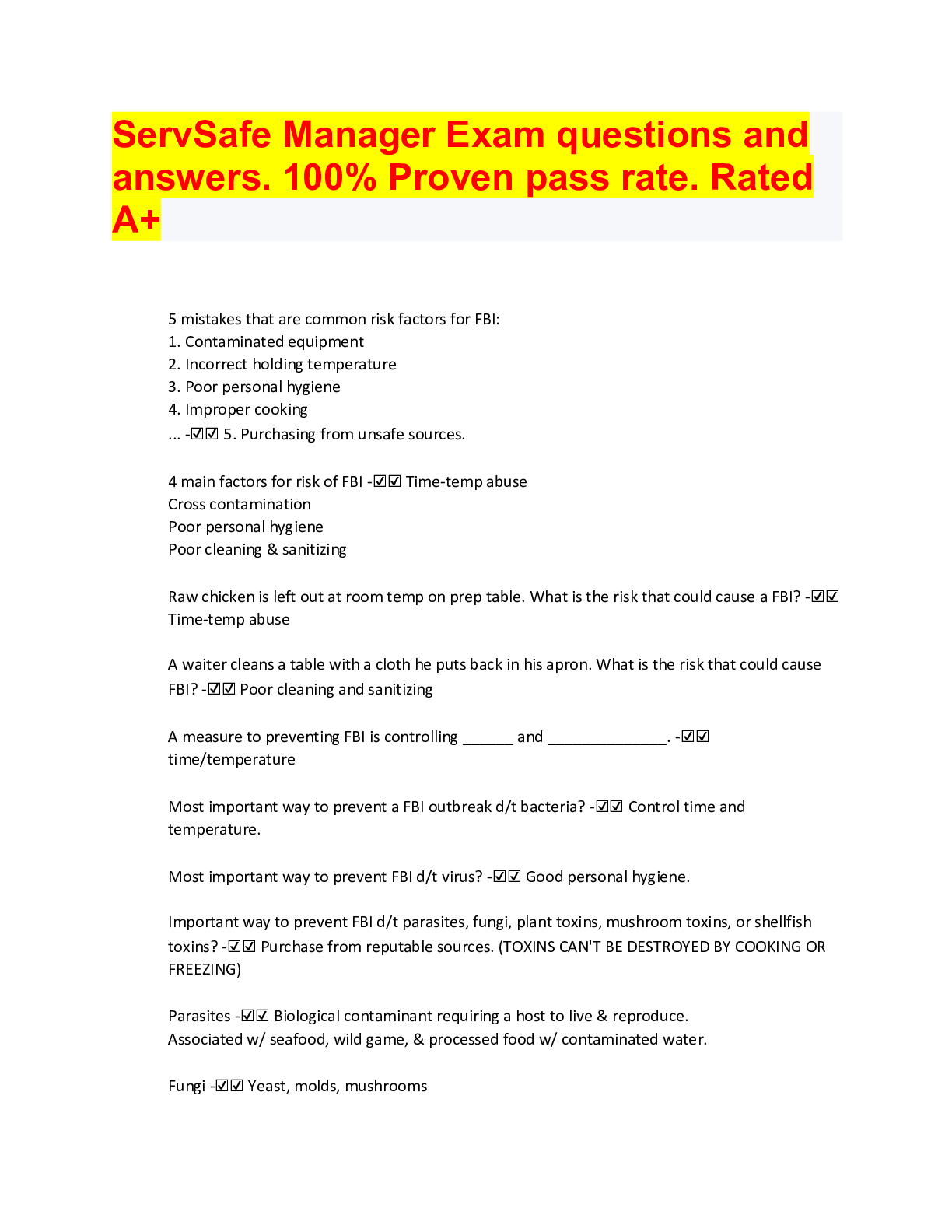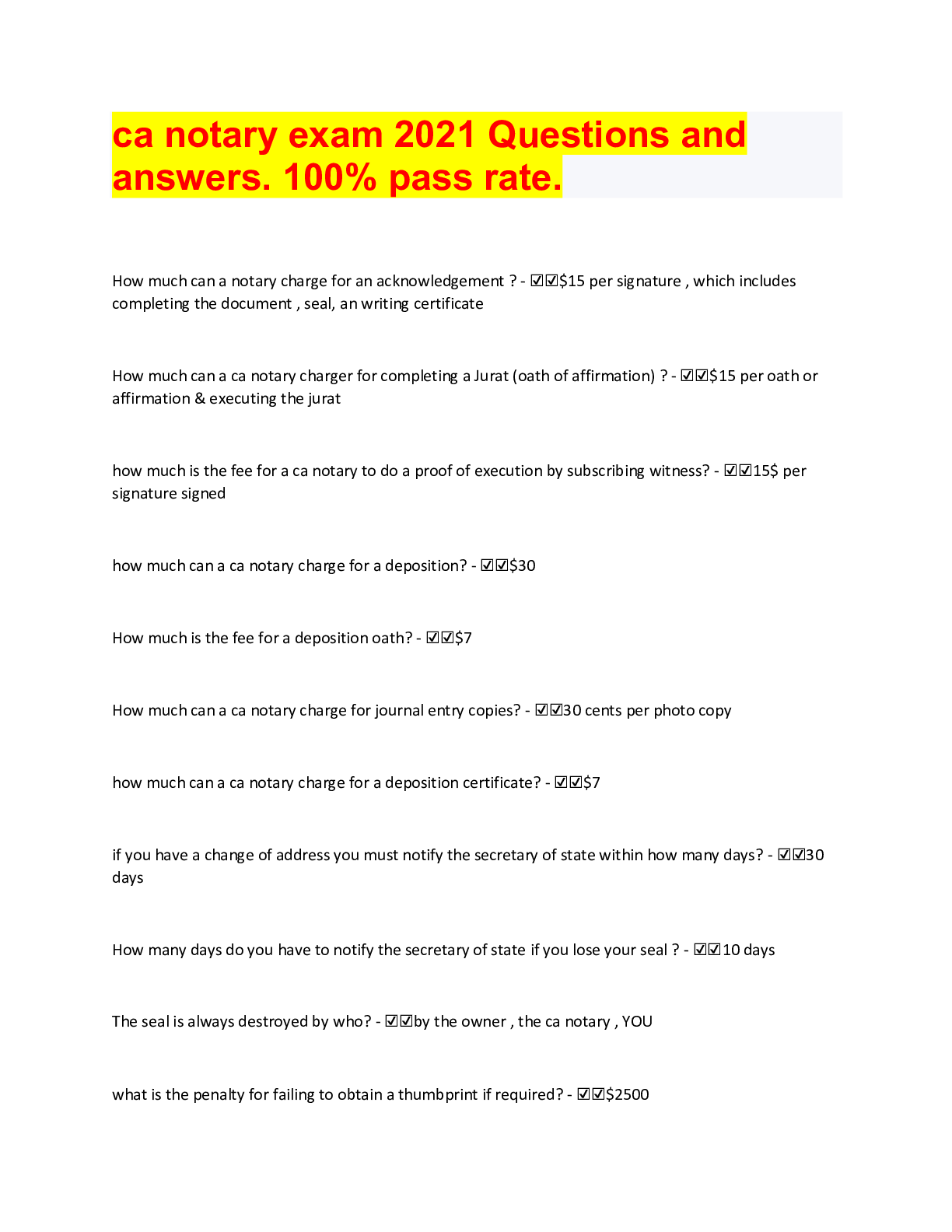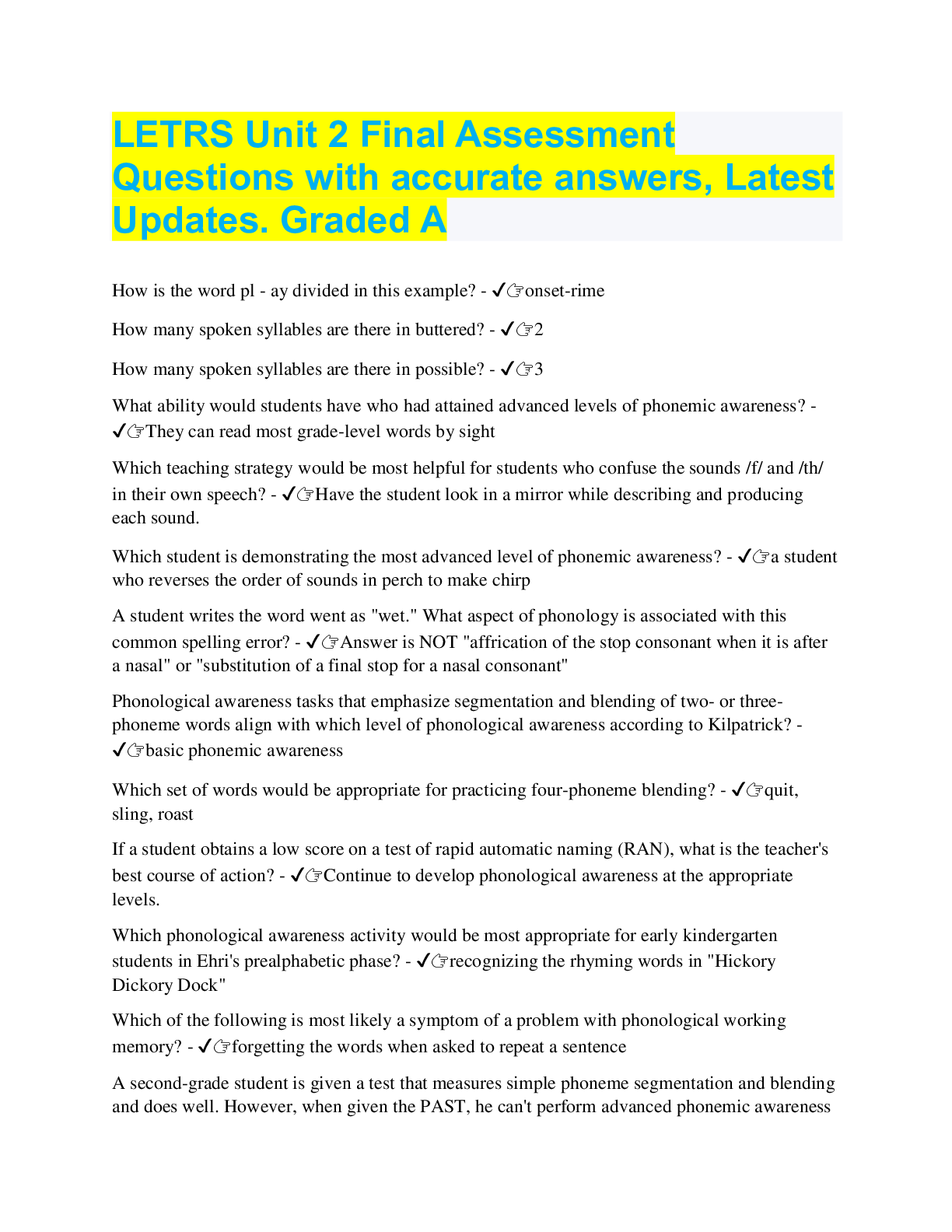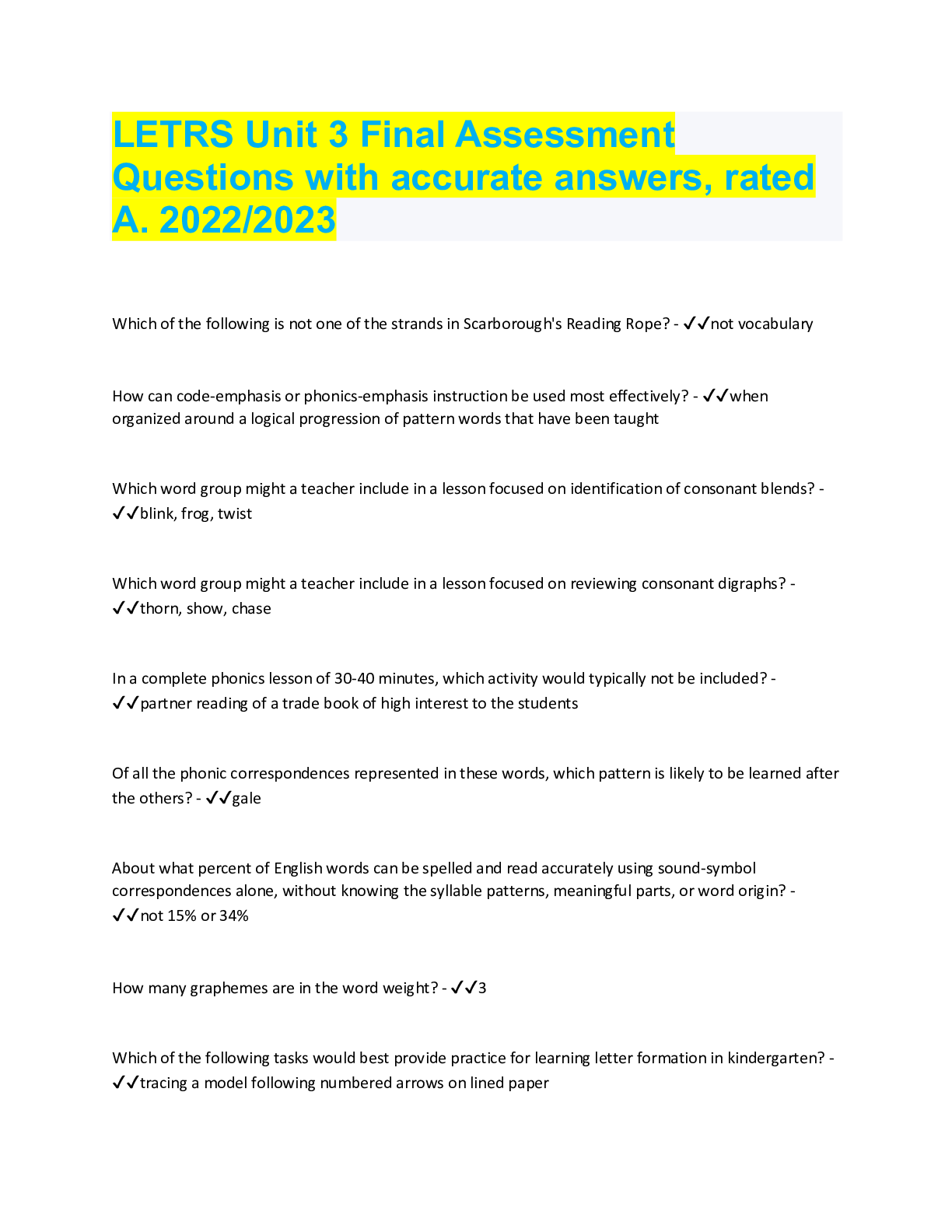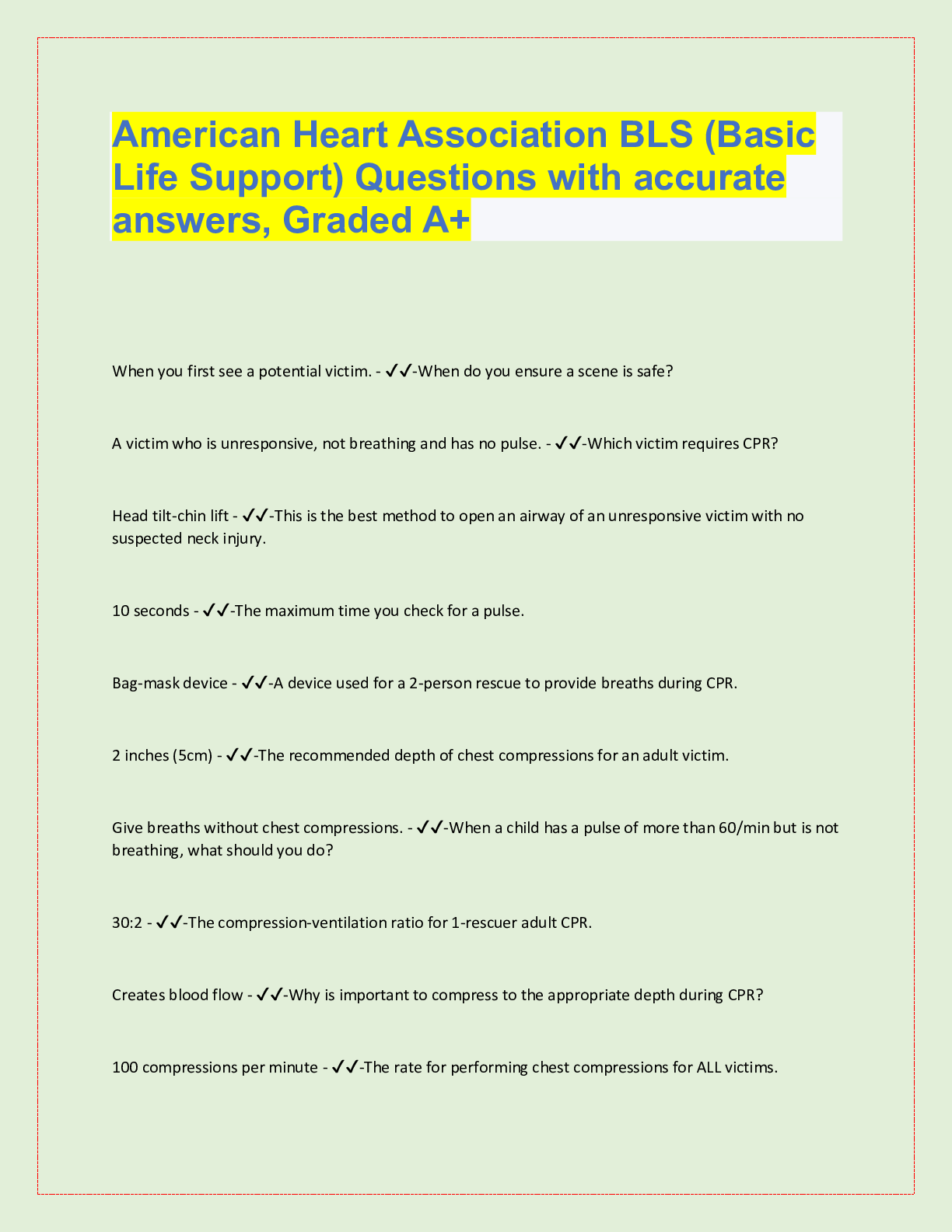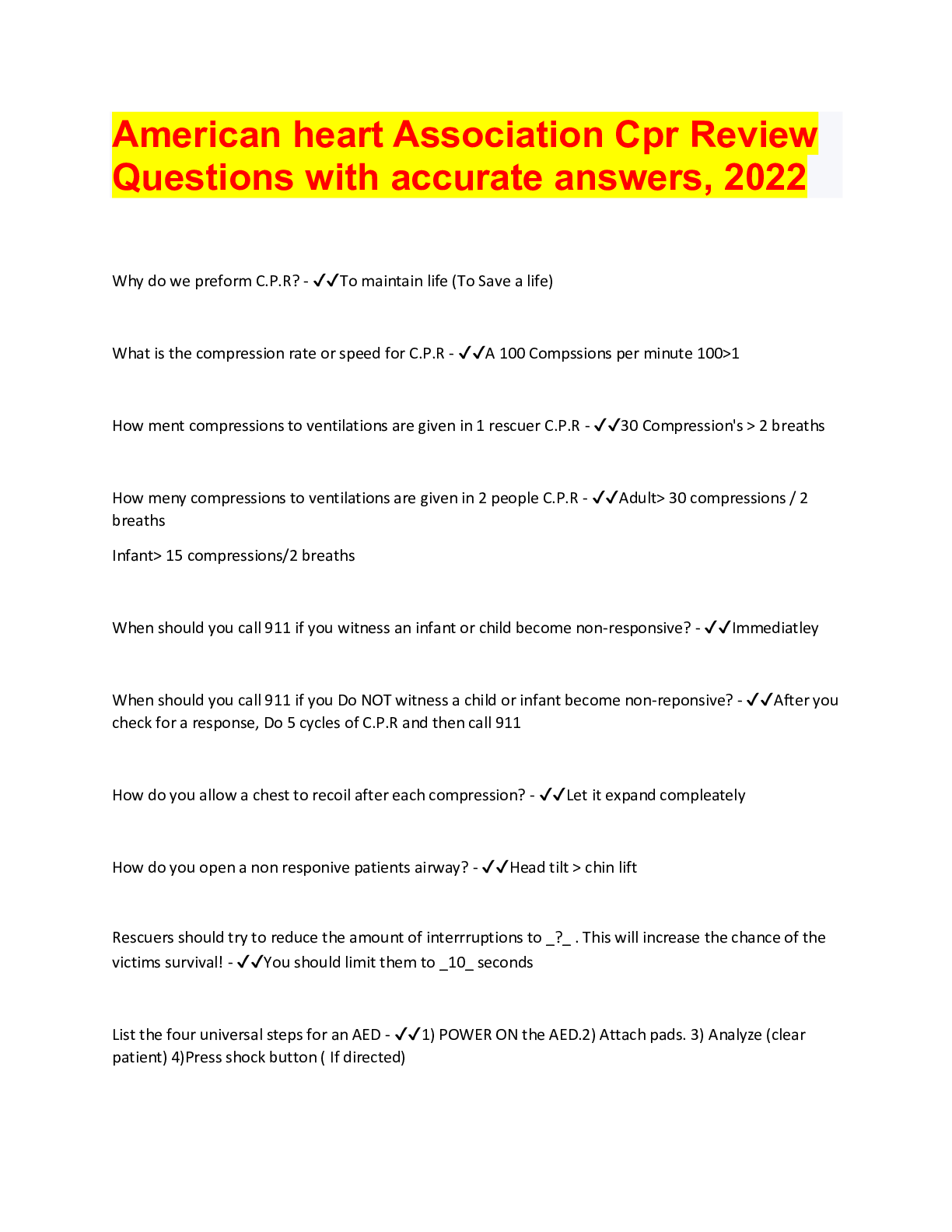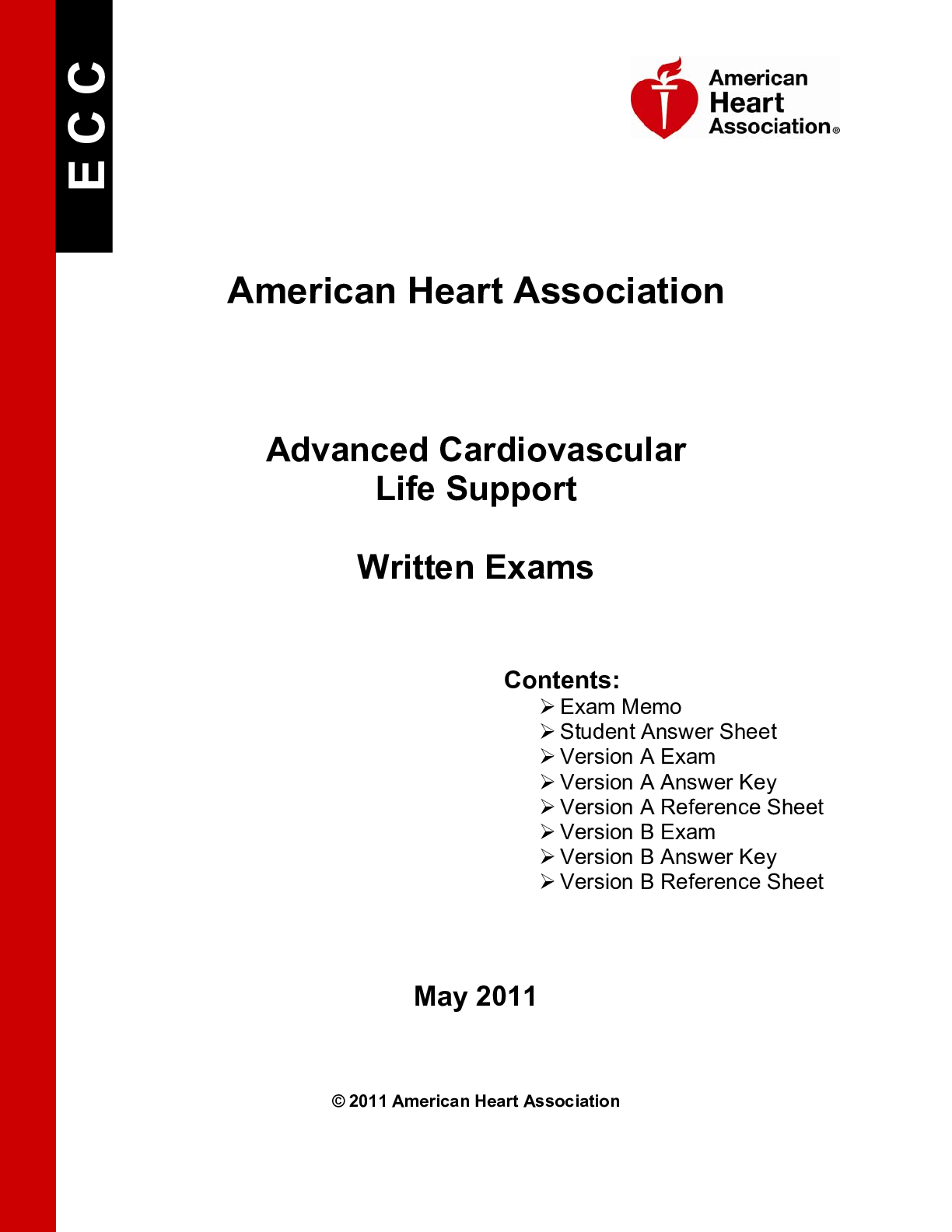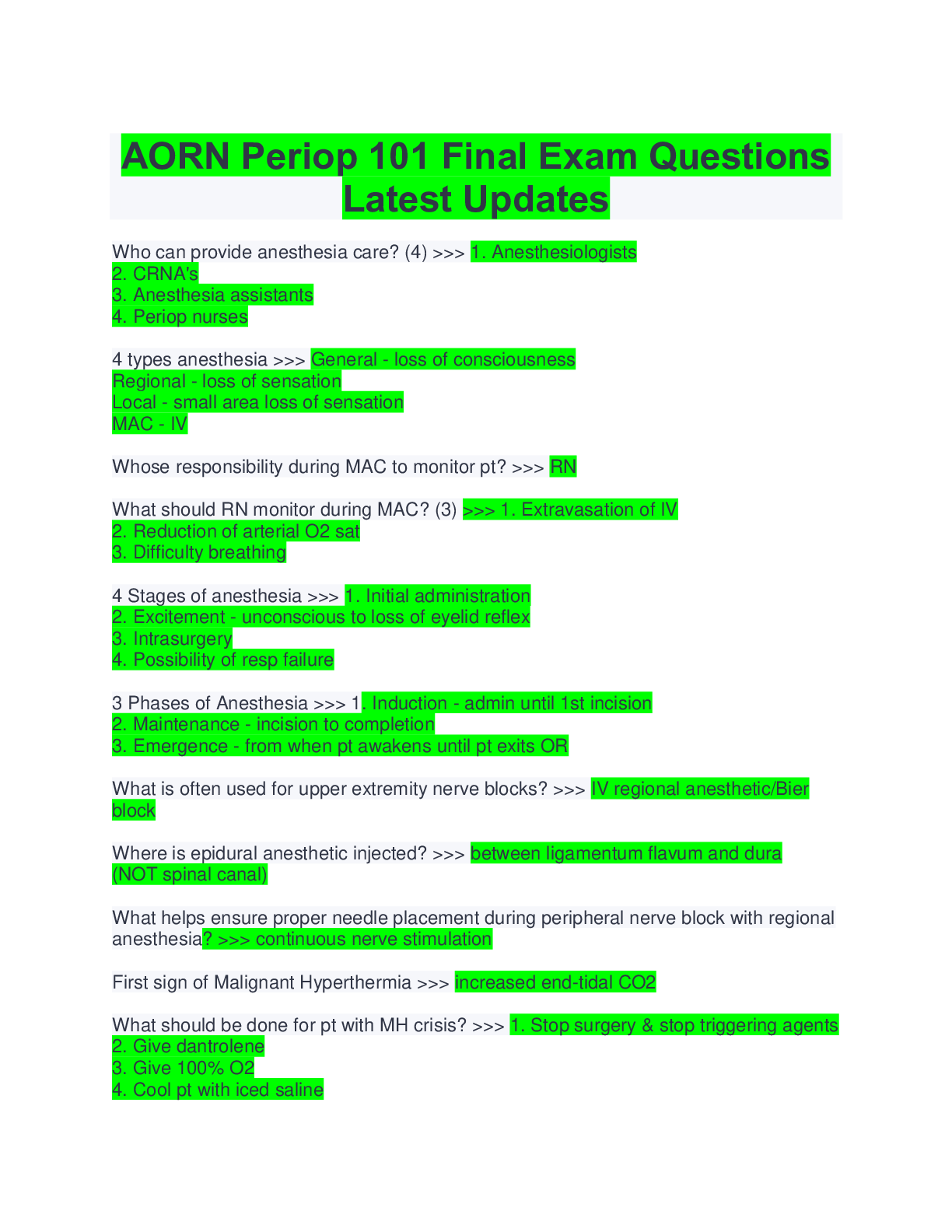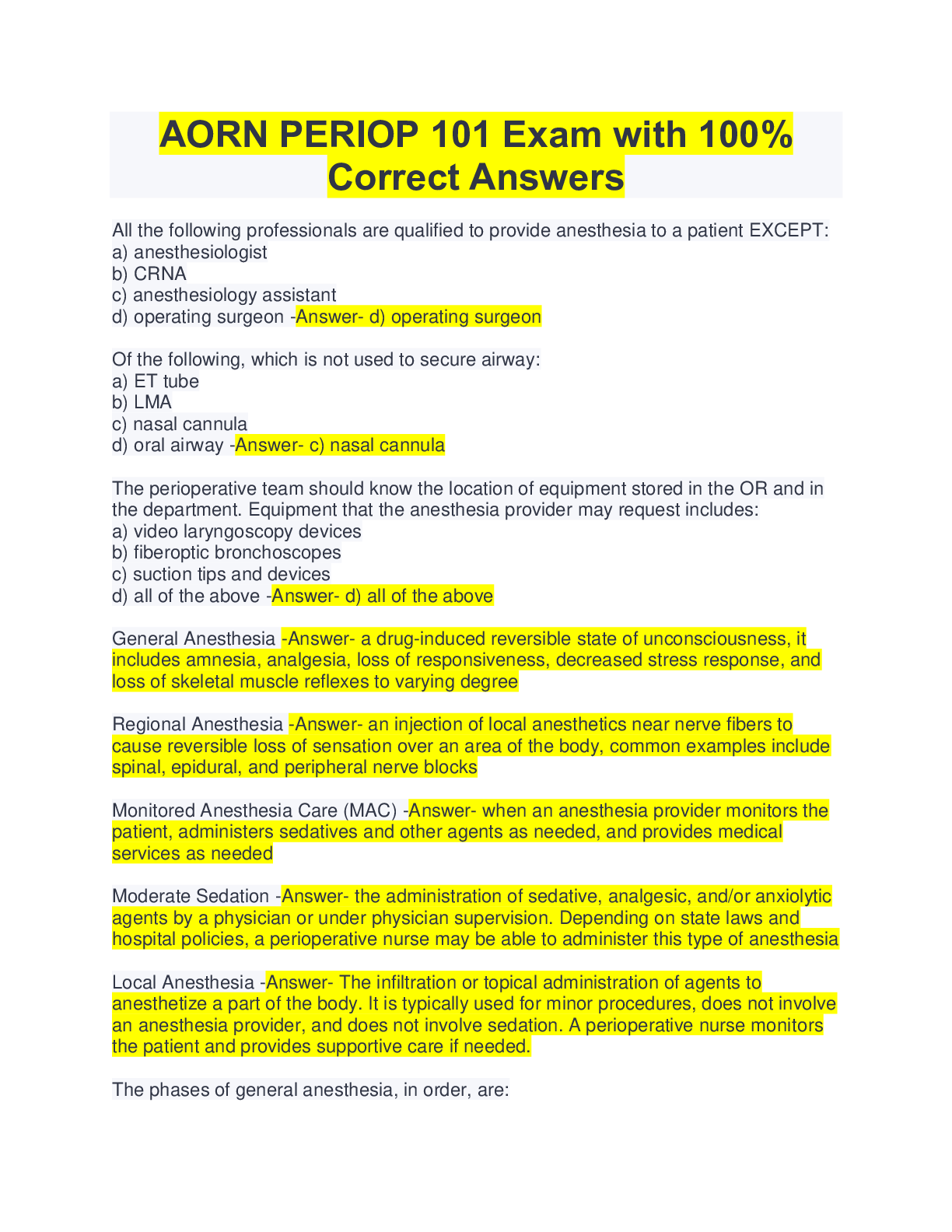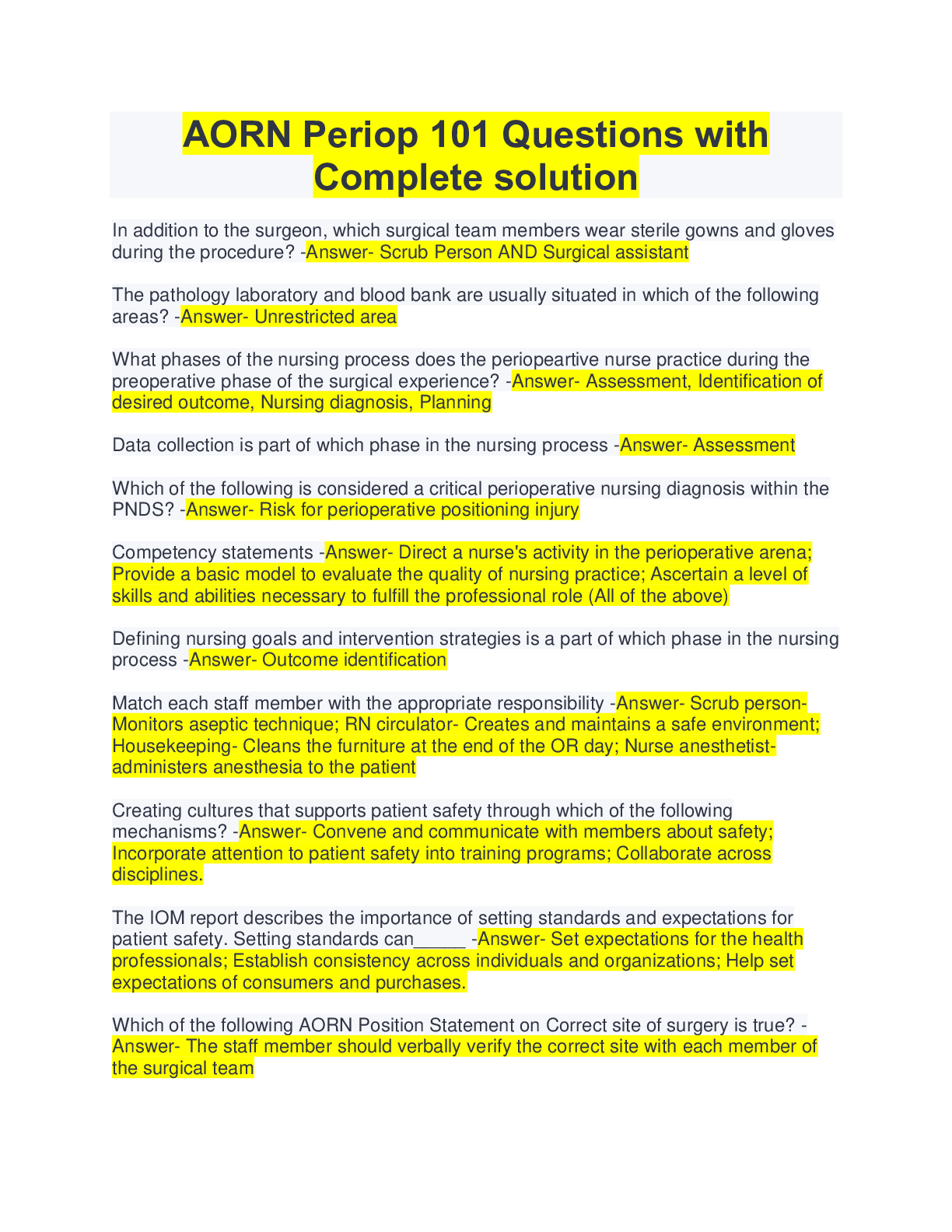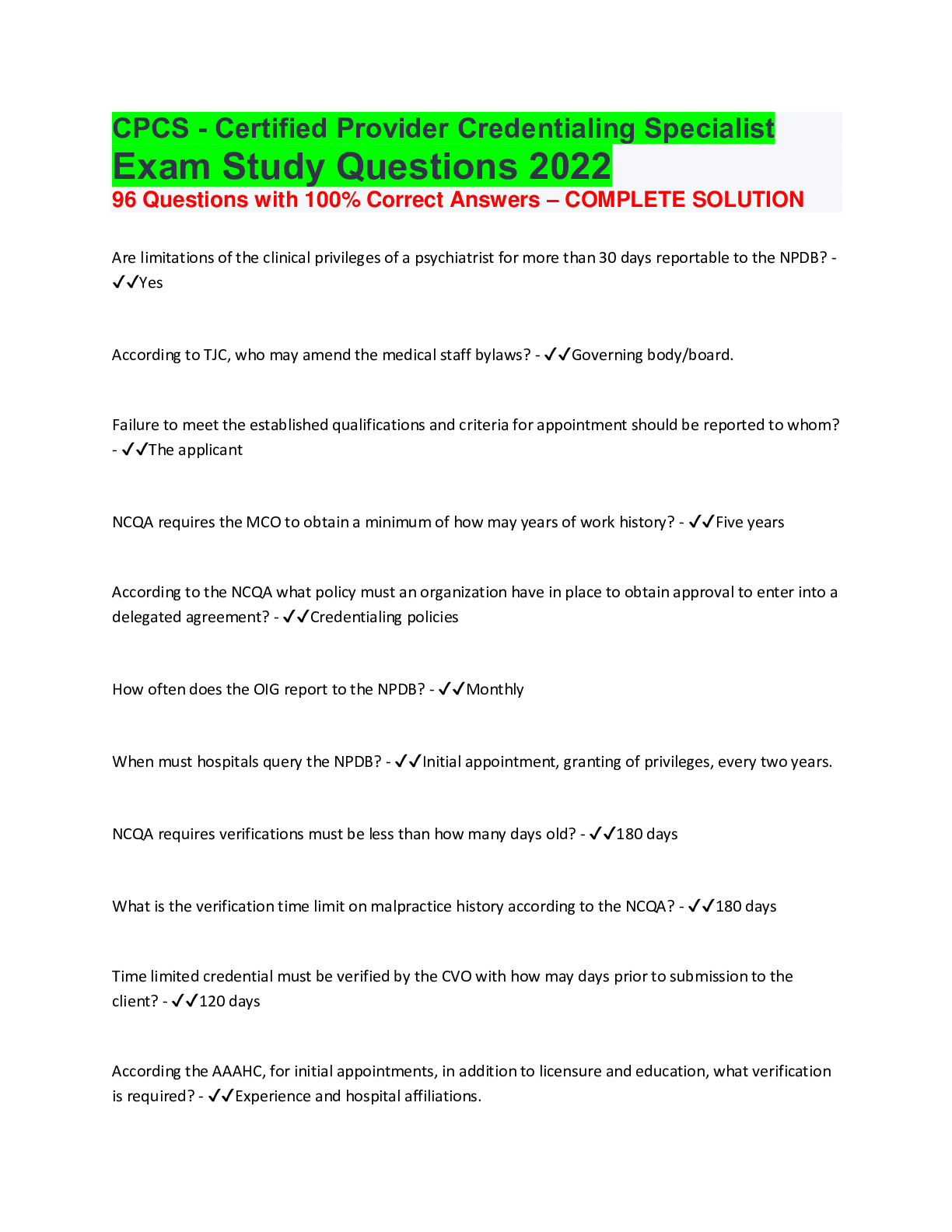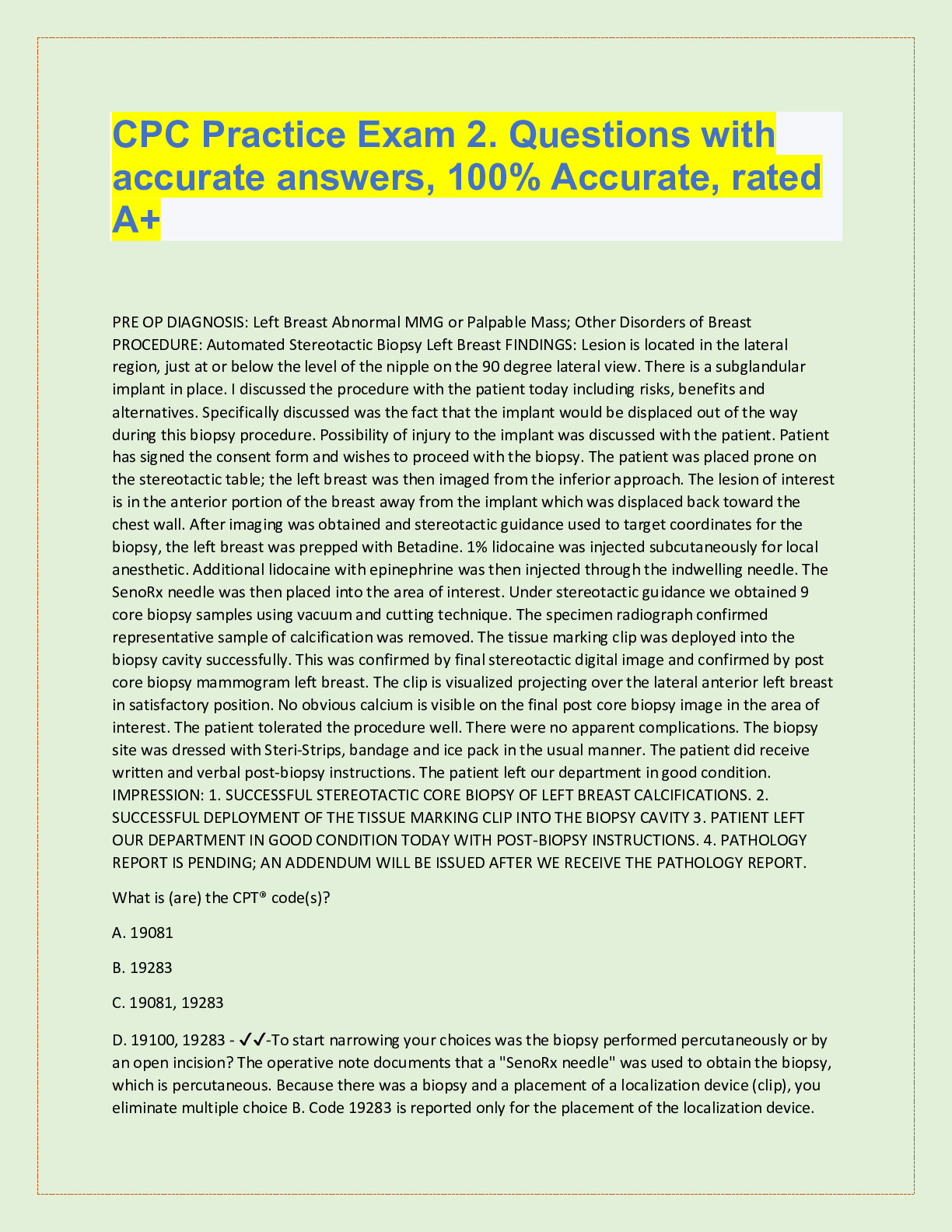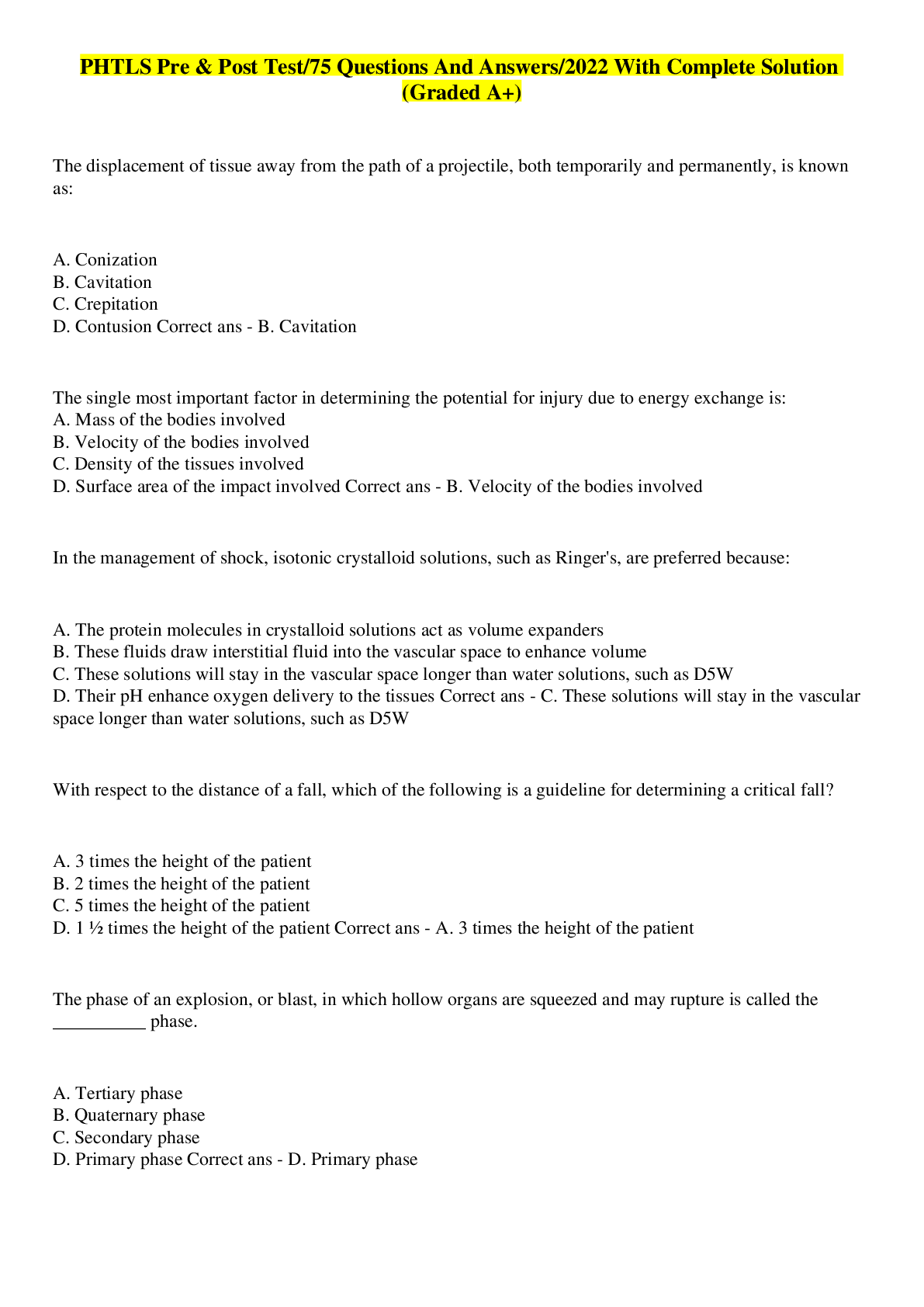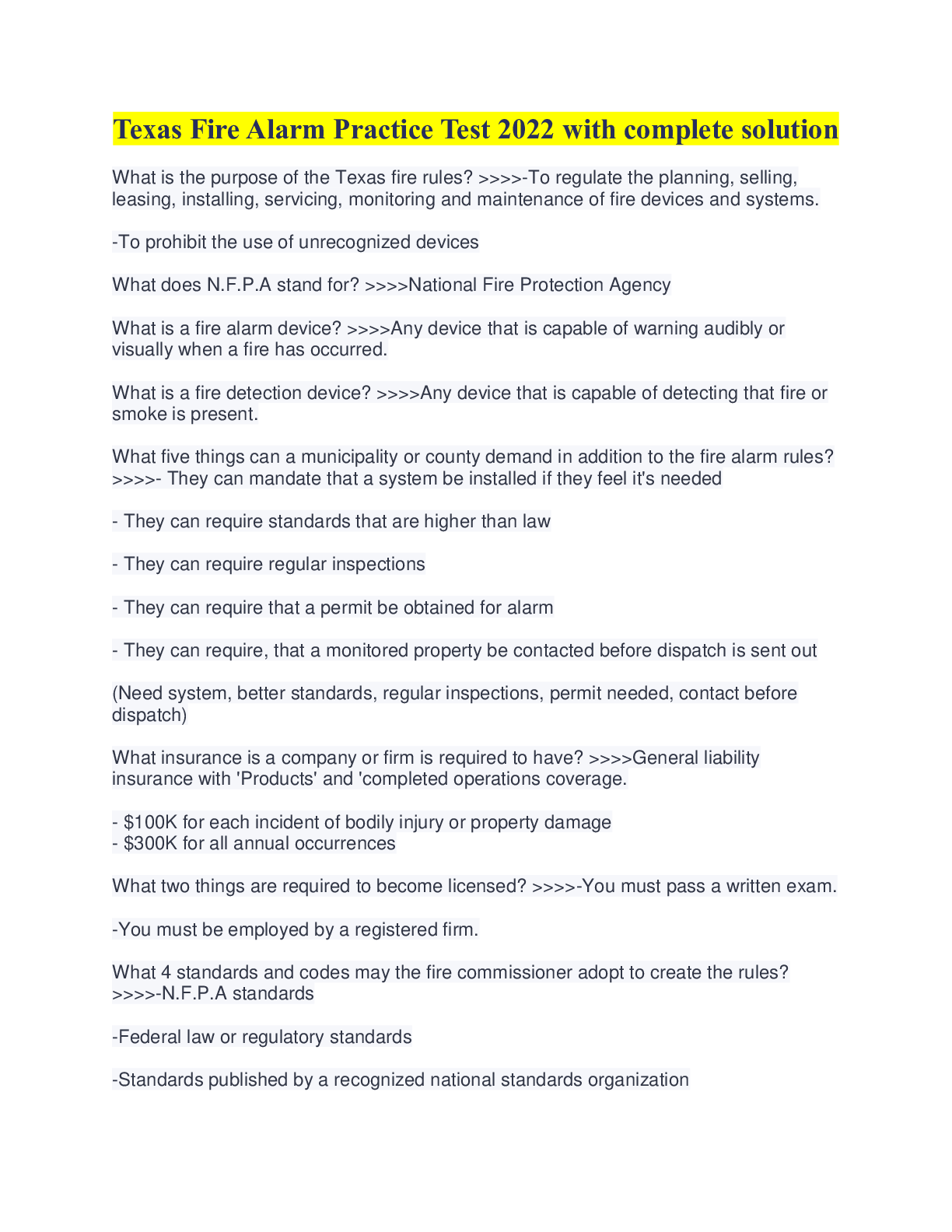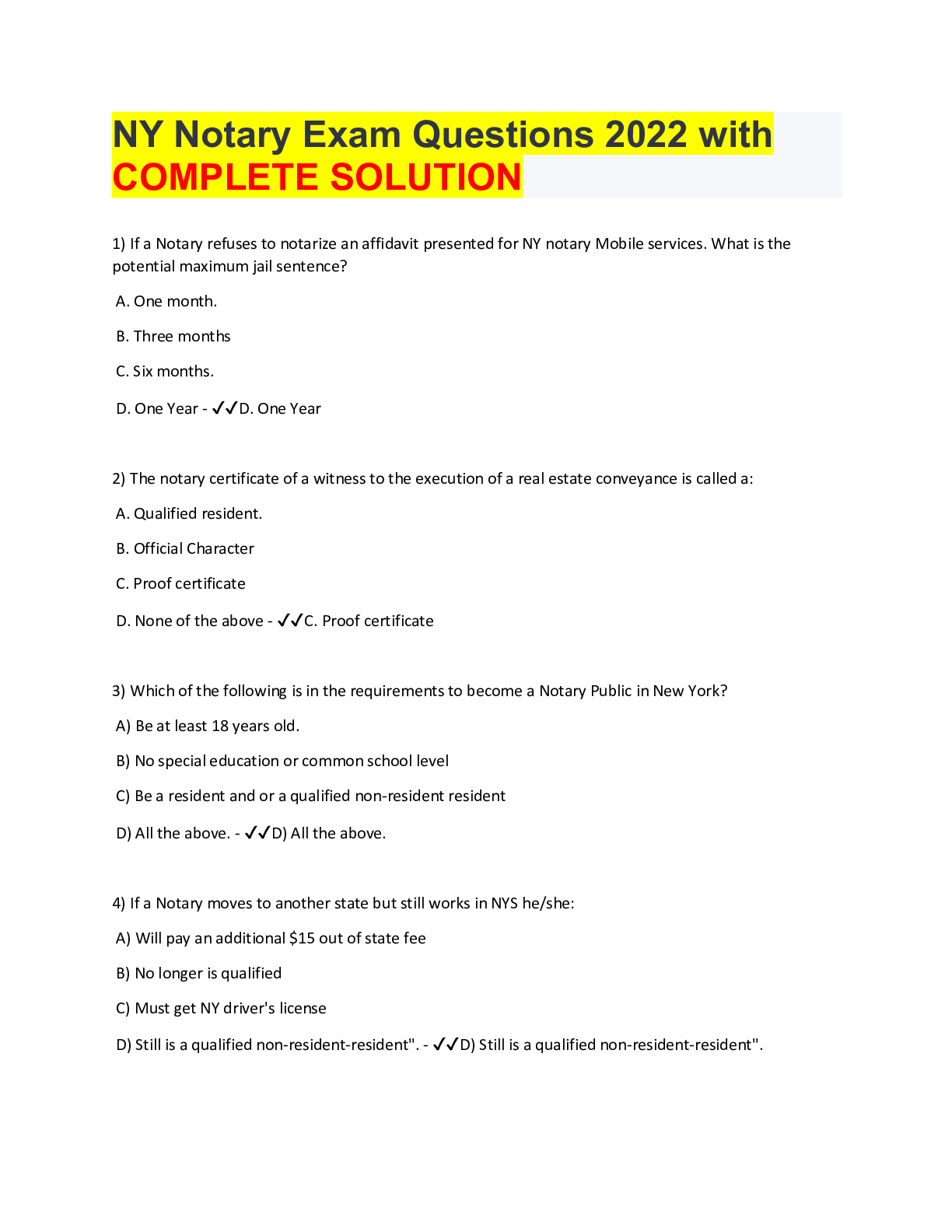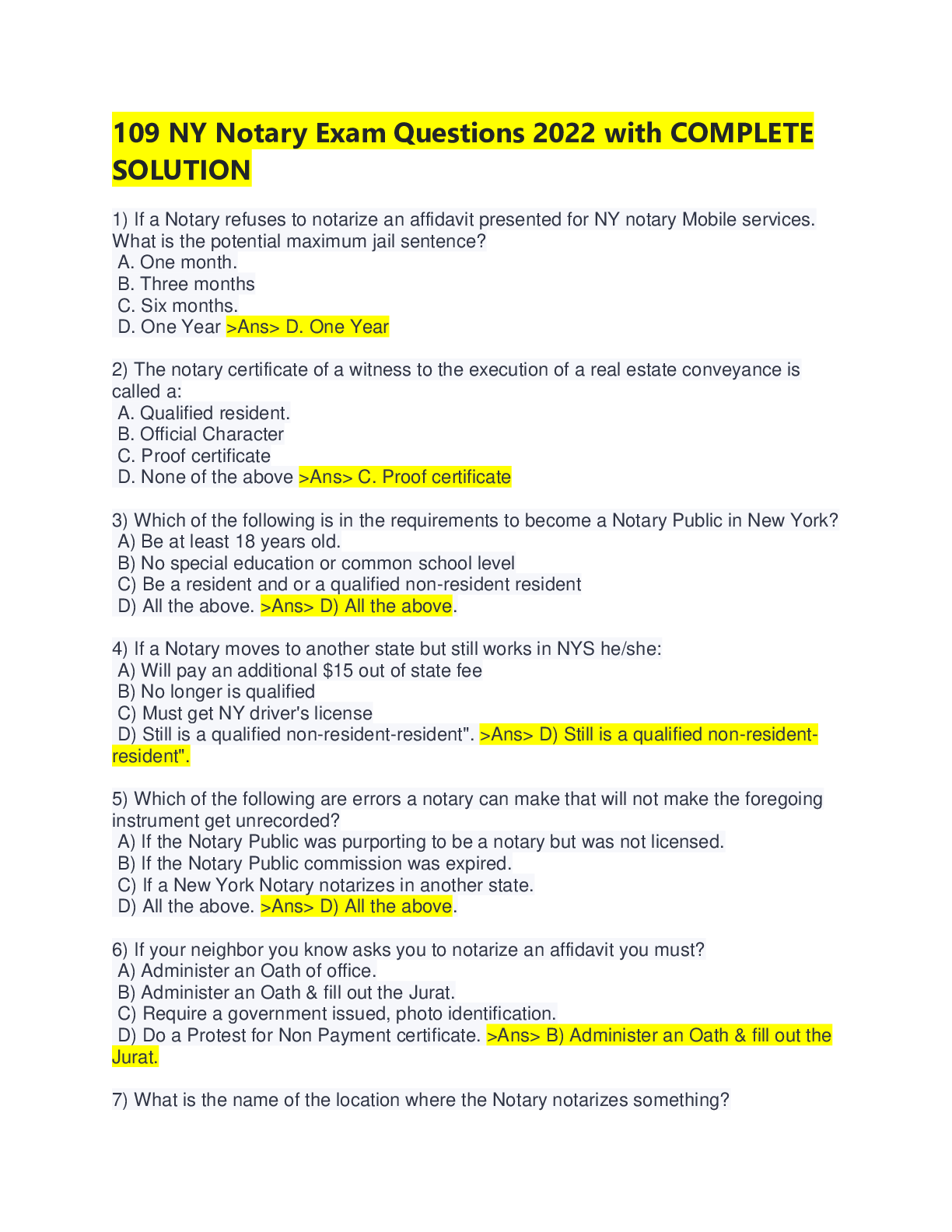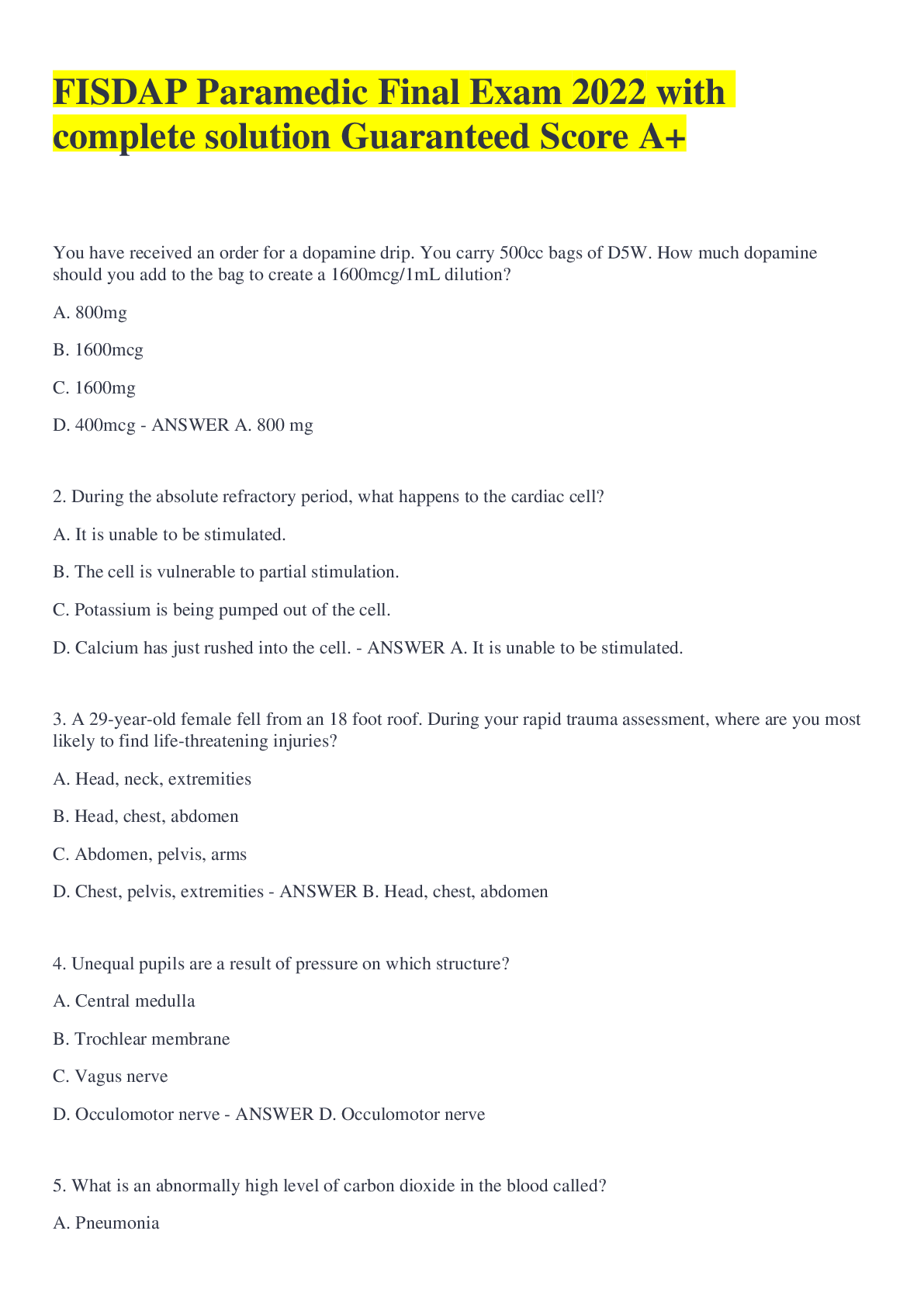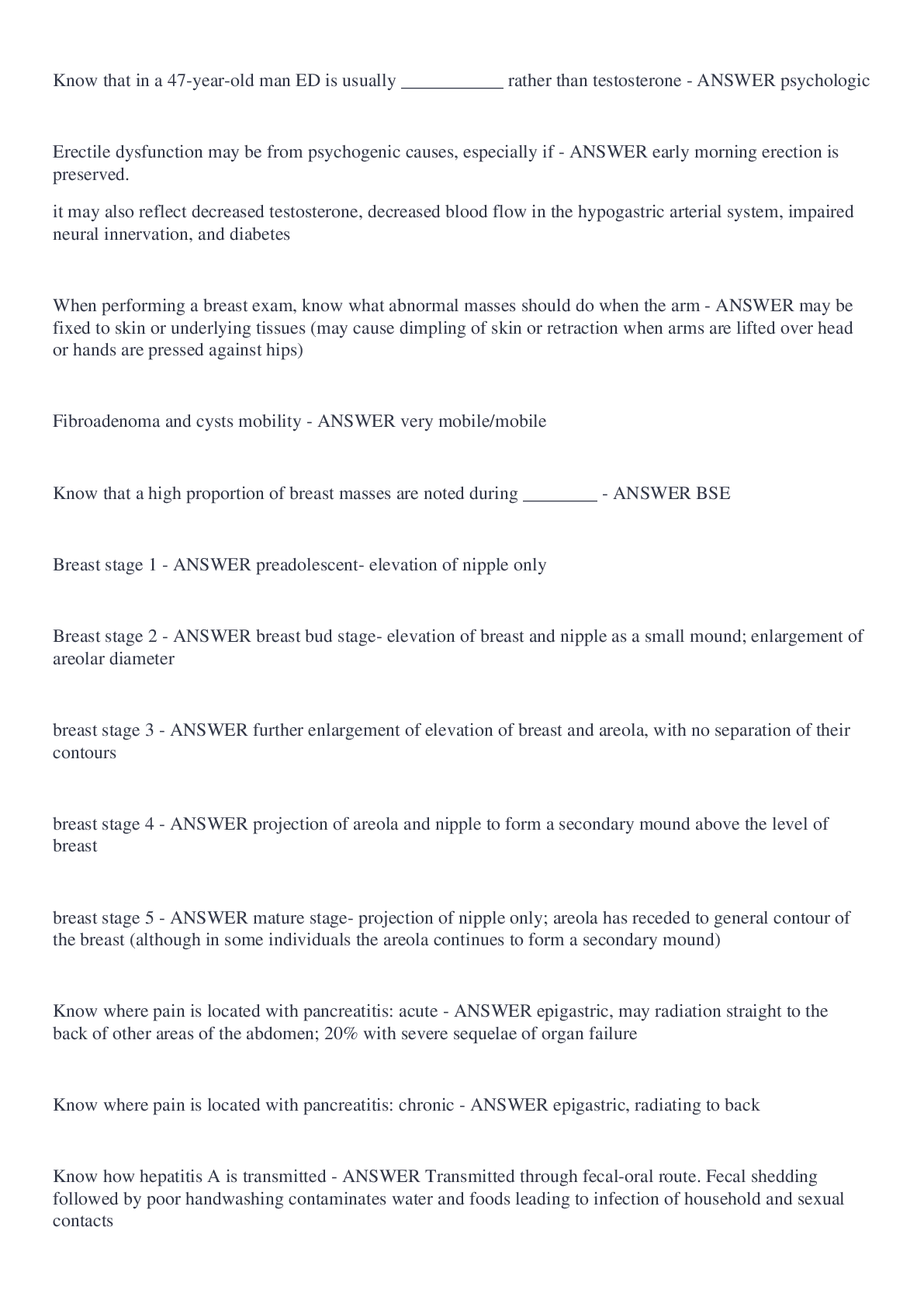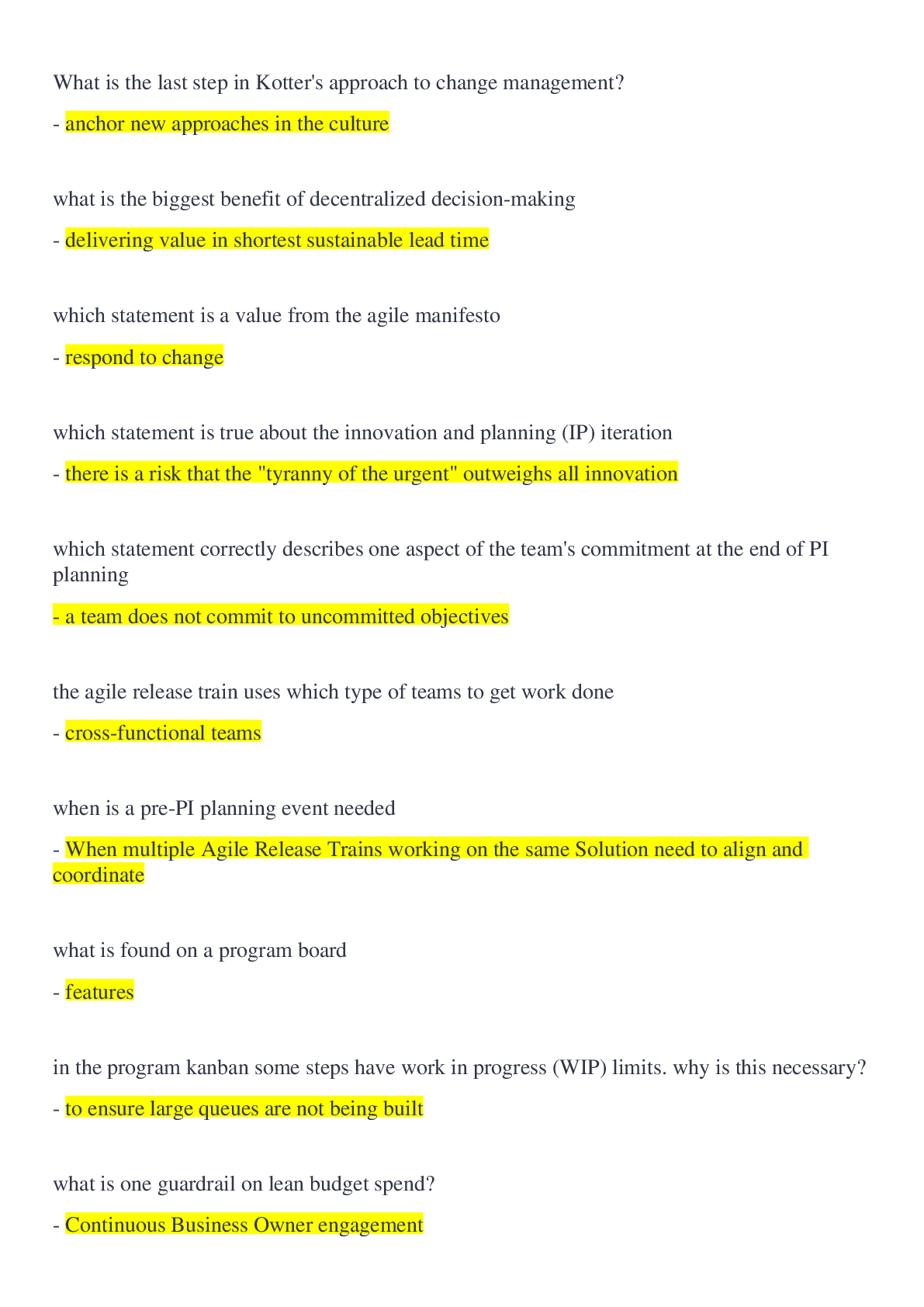Geography > QUESTIONS & ANSWERS > AP Human Geography Exam Review 2022 with complete solution. 2022/2023 (All)
AP Human Geography Exam Review 2022 with complete solution. 2022/2023
Document Content and Description Below
AP Human Geography Exam Review 2022 with complete solution absolute location - The actual space a place occupies on Earth's surface acculturation - The change that occurs within a culture when it a... dopts a practice from another culture agglomeration effects - The cost advantages (external economies) for an individual company gained by locating near similar industries or companies agribusiness - Commercial agriculture in which large corporations own and operate various steps in the production process with an emphasis on profit agricultural density - The number of people living in rural areas per unit of agricultural land alliance - An association among countries for the purpose of mutual defense or trade animism - The belief that spirits (including ancestral) live within objects such as animals, rivers, rocks, trees, and mountains antecedent boundary - A boundary placed before the cultural landscape was developed artifact - Tangible pieces of material culture assimilation - The process in which immigrants become totally integrated into the host culture backwash effect - The negative impact to the peripheral region sometimes caused by increased flows of labor and capital into a nearby high-growth region basic sector - Goods and services produced for individuals outside the urban work area bid rent curve - The concept that the concentric circles in Burgess's concentric zone model are based on the amount people are willing to pay for land in each zone biotechnology - The application of scientific techniques to modify and improve plants, animals, and microorganisms to enhance their value built environment - The material culture of an environment carrying capacity - The number of people an area can support on a sustained basiscentral business district (CBD) - The business area found at the center of every older central city and urban area central place theory - A theory developed by Walter Christaller that states that cities exist for economic reasons and that people gather in cities to share goods and ideas centrifugal force - A strong, divisive force, such as religious differences or a weak communication systems, at work in a country centripetal force - A strong, unifying force, such as a charismatic leader or nationalism, at work in a country chain migration - The part of a migrant flow (usually relatives and friends) that follows former migrants to an area channelized migration - Repetitive pattern of migration not linked to family or ethnicity (senior citizens moving to the Sun Belt) charter group - The first group of settlers to establish a new and lasting culture and society is an area compact state - A state that is basically round in shape, such as Poland or Bhutan) colonialism - A system in which a country declares control over a territory or people outside its own boundaries, usually for economic purposes commodity chain - A chain of activities from the manufacturing to the distribution of a product concentric zone model - The model of urban land use developed by Burgess which demonstrates the invasion and succession processes that occur as the city grows and expands outward confederation - A loose association of states organized for the purpose of retaining cohesion, such as the former republic of the USSR congregation - An ethnic group's grouping together in a specific part of the city to support each other and minimize conflicts with those in the non-ethnic group consequent boundary - A type of subsequent boundary that is drawn to accommodate existing linguistic, cultural, or religious boundaries conservation agriculture - A modern method of farming that balances maximum crop yield with sustainable farming methods and protection of the environmentcreative destruction - The reinvestment of funds in new, profitable ventures and regions that were once used to fund ventures and regions that are now not as profitable creole - A simplified mixture of two or more languages that is adopted in areas of cultural diversity crude birth rate (CBR) - The number of babies born per 1000 people per year crude death rate (CDR) - The number of deaths per 1000 people per year crude density - The number of people per unit of land (also called arithmetic density) cultural barrier - hindrances to cultural diffusion that occur in a society and keep cultural traits from spreading cultural diffusion - The process in which culture is spread from one region to another cultural landscape - The unique landscape made up of all parts of a culture-both material and nonmaterial culture - The cluster of traits that make a group of people special and unique culture region - A portion of the Earth's surface occupied by populations sharing recognizable and distinctive cultural characteristics culture hearth - A place where innovations and new ideas originate and spread outward (diffuse) to other regions culture trait - A single feature of a culture, such as religion or language decolonization - The process by which former colonies gain their independence from the mother country deindustrialization - The reduction in industrial activity that occurs when decreased profits and declining business cause a reduction in industrial employment demographic transition model - A model that shows the link between population growth and economic development using four or five stages of economic development demography - The study of the characteristics of a human population density - The number of an item within a unit of area dependency ratio - The ratio of people under age 15 and those 65 and older to those age 15 to 65dependency theory - A theory of economic development proposed by Andre Gunder Frank based on the periphery's dependence on the core desertification - The transformation of agricultural lands into deserts because of overgrazing and soil erosion MDCs - Countries such as the United States, Germany, and Australia who have the highest levels of economic development developmentalism - The idea that every country and region will eventually make economic progress toward a high level of mass consumption if they only compete to the best of their ability within the world economy devolution - The breakdown of central authority in a country distance decay - The principle that says migrants try to minimize the friction of distance by moving to locations closer to them rather than father away distribution - The array of items on the Earth's surface. All spatial distributions have density, dispersion, and some type of pattern domino theory - The theory prevalent during the Cold War Era that once a country became communist, its neighbors were likely to soon become communist also doubling time - The length of time it takes for a country's population to double in size if the growth rate stays the same dialect - A speech variants of a language, which reflects the local region in which it is spoken ecumene - The part of the Earth that is fit for humans to live edge city - A new urban complex that consists of a large node of office buildings and commercial operations with more workers than residents elongated state - A state that is long and narrow, such as Vietnam or Chile enclave - A piece of territory completely surrounded by another territory of which it is not a part environmental determinism - The theory that human behavior is controlled by the physical environment ethnic enclave - A residential community where the residents either voluntarily live, or are forced to live, in a segregated (separated) fashion due to race, religion, or ethnicityethnic island - A small ethnic settlement centered in the middle of a larger group of the population ethnic religion - A religion that is part of a particular ethnic or political group (Judaism, for example) ethnocentrism - The belief that one's own ethnic group is superior to all others exclave - An outlier, or piece of a territory, that is completely enclosed within the borders of another country exclusive economic zone (EEZ) - An expanse of water up to 200 natural nautical miles off a country's coast that is designated for that country's natural resource exploration and exploitation export-processing zones (EPZs) - Small areas of a country with exceptional investment and trading conditions that are created by its government to stimulate and attract foreign investors and business federal state - A type of government that gives local political units such as states or provinces within a country a measure of power First Agricultural Revolution - The domestication of plants and animals and the resulting start of a sedentary society (also called the Neolithic Agricultural Revolution) first effective settlement - The first group (charter group) of settlers who establish a new and lasting culture and society in an area fixed cost - The cost of land, plant, and machinery that is not variable folk culture - A homogenous group of people with a strong family structure who follow a simple, traditional lifestyle of self-sufficiency and independence from the society's cultural mainstream footloose firms - Firms that produce something that requires minimal transport costs Fordism - The process (named after Henry Ford, its founder) of using assembly-line techniques and scientific management in manufacturing formal region - A region with a high level of consistency in a certain culture of physical attribute forward capital - A capital city that is located away from the core region for economic or political reasons in a symbolic gesturefragmented state - A state that has two or more areas of territory separated by another country functional region - A region with a node, or center hub surrounded by interconnecting linkages. Usually connections relate to trade, communication, transportation, etc. gateway city - A city that served as the control center for a former colonial power gentrification - The process of renovating an older, run-down neighborhood near the center city by middle-class and high-income families GIS - The marriage of mapping software with a database for the purpose of overlaying various data layers on a basic, locational map grid gerrymandering - The process of redrawing territorial district boundaries to favor a certain political party ghetto - An ethnic enclave where the residents live segregated (separated) by race, religion, or ethnicity in a voluntary or sometimes, forced, manner ghetto - The concentration of a certain group of residents in a certain residential area against their will through legal means or social discrimination globalization - The increasing interconnection of all regions in the world through politics, communication, transportation, marketing, manufacturing, and social and cultural processes GMO (genetically modified organisms) - An organism that is created when scientists take one or more specific genes from one organism and introduce them into another organism thus creating a new version gravity model - A law of spatial interaction that states that larger places attract people, ideas, and goods more strongly that smaller places Green Revolution - The development and transfer from the developed world to the developing world, of higher-yield and fast-growing crops through new and improved technology, pesticides, and fertilizers, for the purpose of alleviating world hunger GDP - The approximate value of all final goods and services produced in a country per year gross national product (GNP) - The gross domestic product (GDP) plus the value of income from abroad such as earnings from a US company based abroad growth pole - An urban center deliberately placed by a country's government to stimulate economic growth in the hinterlandheartland-rimland theory - Halford Mackinder's theory that the country that dominated the landmass of Eurasia (heartland) would eventually rule the world (rimland) hierarchial diffusion - The adoption of an official language by the ruler or administration, a language diffused downward into the society hinterlands - The surrounding trade area of an urban area host society - The dominant culture group in an area receiving a minority group human capital theory of migration - The migration theory that states that educated workers often migrate from poor countries to wealthy countries seeking better-paying jobs [Show More]
Last updated: 1 year ago
Preview 1 out of 16 pages
Instant download
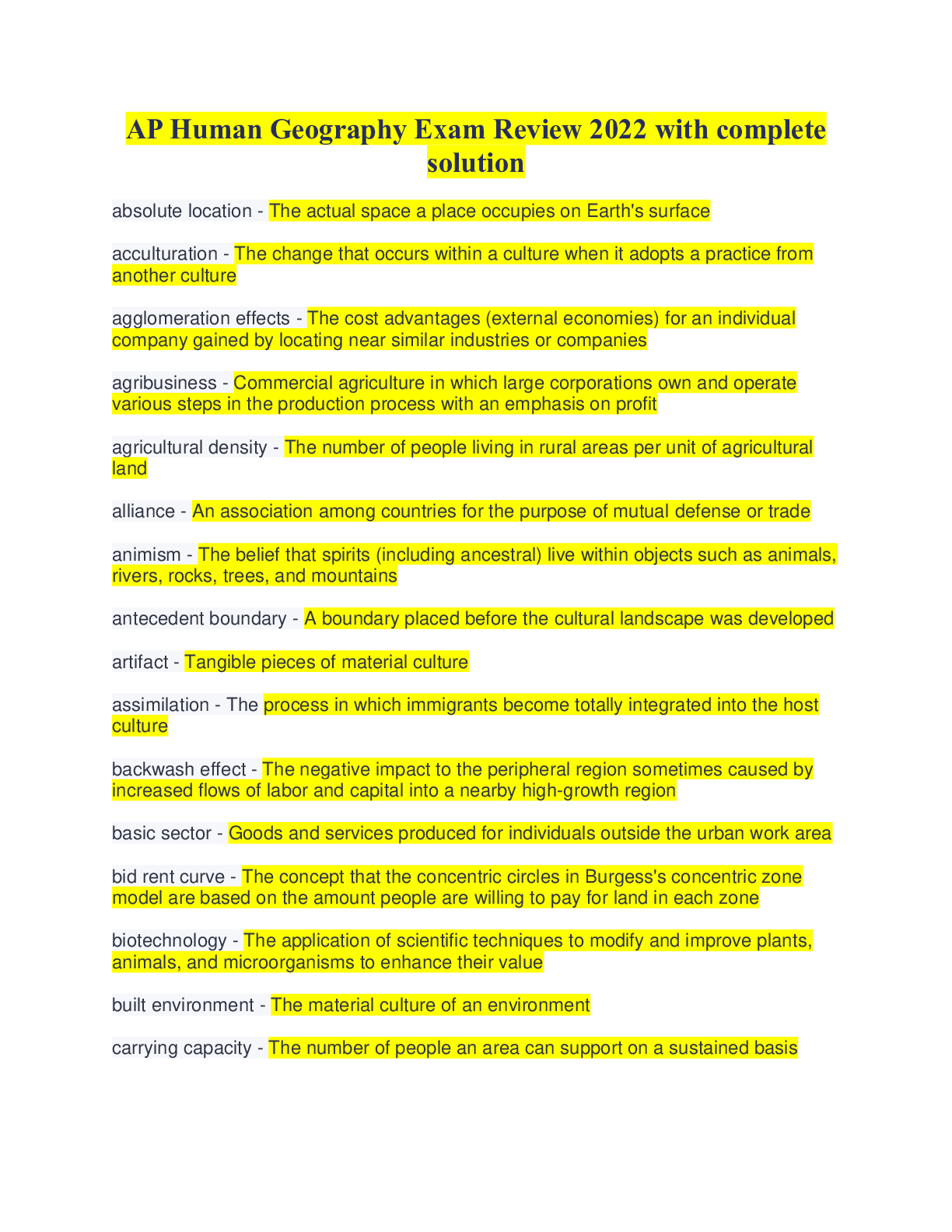
Instant download
Reviews( 0 )
Document information
Connected school, study & course
About the document
Uploaded On
Sep 21, 2022
Number of pages
16
Written in
Additional information
This document has been written for:
Uploaded
Sep 21, 2022
Downloads
0
Views
83

